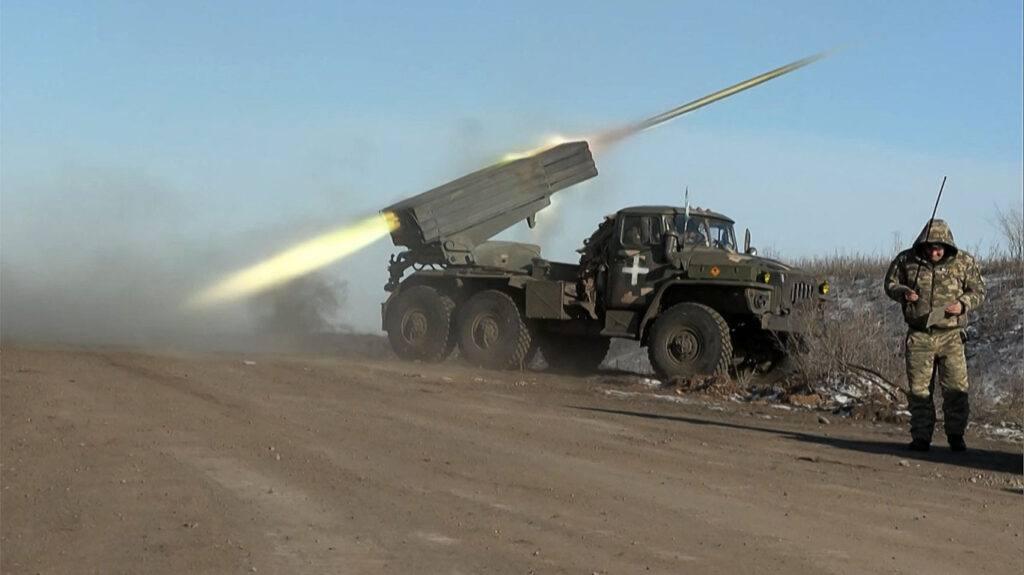
The foto has taken from The Moscow Times
STRATEGIC ASSESSMENT. Russia’s Defense Ministry claimed that its forces had won a significant victory on Friday with the capture of the eastern Ukrainian town of Soledar, despite military analysts cautioning that the salt-mining town held greater symbolic than strategic value.
The situation on the ground in what remains of Soledar remained unclear late Friday, with Ukrainian officials stressing that fighting was still ongoing.
A camera crew with U.S. network CNN reported seeing Ukrainian troops retreating in good order on the outskirts of the town late Friday.
If the Russian seizure of Soledar is confirmed, it will likely be hailed in Moscow as a significant victory after months of reversals on the battlefield.
It is also expected to boost the political profile of the founder of mercenary company Wagner, Yevgeny Prigozhin, whose fighters were heavily involved in the operation.
However, according to military analysts, control of the town, which had a pre-war population of about 10,000, will give Russia little advantage in the ongoing fighting — apart from improving its position in the battle for nearby Bakhmut.
“Soledar itself has no major strategic significance,” said Israel-based military expert David Sharp.
“Its capture should be viewed as part of the battle for Bakhmut — of course, it will improve Russia’s position in Bakhmut from the north, but the Russian military would need further progress in the area,” he told The Moscow Times.
Russia’s Defense Ministry attempted to portray the seizure of Soledar as a milestone in the months-long battle for Bakhmut, saying in a statement on Friday that the town’s fall was “important” and would allow Russian forces to cut Ukrainian supply lines in the area.
Russian state media war correspondent Alexander Sladkov posted a video of what appeared to be the corpses of Ukrainian soldiers in Soledar, with the caption “Another Ukrainian failure.”
However, the U.S.-based Institute for the Study of War said the fall of Soledar was unlikely to lead to Bakhmut’s imminent encirclement.
“The capture of Soledar — a settlement smaller than 5.5 square miles — will not enable Russian forces to exert control over critical Ukrainian ground lines of communication into Bakhmut nor better position Russian forces to encircle the city,” the think tank said in its daily briefing released on Thursday.
There are no official casualty figures for the battle for Soledar, but more than eight months of fighting for control of Bakhmut is believed to have left a death and injury toll in the thousands on both sides.
Some observers believe the intensity of the fighting in Soledar and Bakhmut is due to the ambitions of Prigozhin, who has apparently pushed Wagner recruits into the thick of the fighting in his attempt to secure a battlefield victory.
On Tuesday Prigozhin posted a photo of himself with a group of soldiers in what he claimed was a salt mine in Soledar, adding that Wagner alone has been responsible for the Russian victory.
“I want to emphasize once again that no units took part in the assault on Soledar except Wagner fighters,” Prigozhin said in a statement issued the same day.
In particular, Wagner has deployed former inmates recruited from Russia’s prisons — with a promise of securing an early release — to the frontlines around Bakhmut.
Sharp said that Russia’s readiness to use former inmates to fight in Ukraine represented a unique resource that improved its chances of winning, even if the ex-cons had been “ruthlessly spent at the front.”
Prigozhin has for months been locked in a dispute with Russia’s military commanders, whom he has repeatedly criticized for what he describes as their incompetence and timidity.
The former Kremlin caterer, who is believed to be close to Russian President Vladimir Putin, has expressed his anger about the Defense Ministry’s claim of victory in Soledar.
“They are constantly trying to steal victory from Wagner,” Prigozhin said in a statement released on Friday.
The public spat over who can claim to have captured Soledar is the best evidence yet of bad blood between Prigozhin and the Defense Ministry, according to political analyst Abbas Gallyamov, a former speechwriter for Putin.
“The one who took Soledar after several months of no victories will certainly win in the eyes of Putin,” Gallyamov told The Moscow Times.
“[But] the inability to exercise self-control in this dispute suggests that it’s not just about gaining more influence,” Gallyamov added. “Something very important must be at stake.”
If Russia’s forces were to use the advantage gained around Soledar to push Ukrainian forces out of Bakhmut, it would give them a small, strategic foothold to launch a wider offensive against the Ukrainian-held cities of Sloviansk and Kramatorsk to the north.
Bakhmut also sits on a crucial highway that runs diagonally through Ukraine’s Donetsk and Luhansk regions.
Among other things, the fate of Bakhmut depends on the state of Ukrainian defenses and whether Ukrainian forces have managed to withdraw without major losses from Soledar.
“At the moment, it’s impossible to predict anything at the frontline,” Sharp said.
“The question is whether the Ukrainians prepared lines of defense, whether they transferred reserves, whether the units that were in Soledar retain further combat capability,” he said.
While Soledar’s fall will strengthen Russian positions around Bakhmut, the Institute for the Study of War agreed with the general consensus among independent military analysts that its significance in the wider conflict is limited.
“Russian information operations have overexaggerated the importance of Soledar,” the think tank said. “Which is at best a Russian Pyrrhic tactical victory.”





